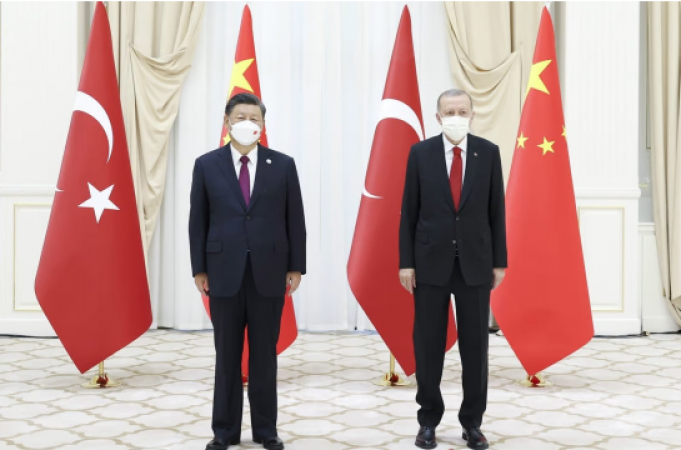
Beijing: Turkey may rely more on development under the Belt and Road Initiative in the future, according to analysts, despite being a middle power with security connections to the United States and economic ties to China.
Turkey and China celebrated 51 years of diplomatic and commercial relations this year. President Xi Jinping informed his Turkish counterpart Recep Tayyip Erdogan in September that Beijing was ready to take their 2010-established strategic partnership to a new level.
Some believed that the meeting at the Shanghai Cooperation Organization summit in September marked the beginning of a new era in relations between the two countries.
Also Read: Property curbs investors are not convinced despite China relaxing some zero-Covid policies
However, there are still significant differences, such as how Uighur Muslims are treated in China, Turkey's membership in NATO, and transatlantic security.
As a member of NATO, Turkey will be wary of China's security, according to Li Lifan, a senior fellow at the Shanghai Academy of Social Sciences.
However, the development of the digital economy under the Belt and Road Initiative will depend on Chinese technology and resources.
To coordinate the development of the Belt and Road Initiative along the Central Corridor, a trade initiative from Ankara that seeks to link China with Europe via Turkey by road and rail, the two countries signed a memorandum of understanding in 2015. Did it
Turkey's route will pass through the Caucasus and Central Asia before reaching China's western Xinjiang region, taking advantage of the country's transcontinental location.
Turkey needs investment to build a railway between the northeastern city of Kars and the capital Ankara in order to make the Central Corridor run smoothly, according to Gokhan Tekir, an assistant professor at the department of international relations at Ankara Haci Bayram Veli University.
According to Tekir, the Turkish government views the Belt and Road Initiative as a means of achieving its objective of connecting Beijing and London.
According to Altai Atli, founding manager of Istanbul-based consultancy Atli Global, only a port and a power plant, both still under construction, can be considered major investments in Turkey.
Also Read: 'If food crisis arises, you'll not...,' PM Modi's message to world at G-20 Summit
According to Atli, Turkey's economic growth through international cooperation should proceed regardless of political allegiance or ideological considerations.
There is a more business- and practical-minded approach," he claimed. What matters in terms of Chinese investments in Turkey is how much they will boost the economy, according to the statement.
According to Turkey's data for the first nine months of the year, its top import partners were Russia and China, while its top export destinations were Germany and the US.
As of 2021, China was Turkey's second largest trading partner after the United States.
Turkey needs investments in telecommunications, energy and a strong transportation system, according to Emre Demir, assistant professor in the Department of Political Science and International Relations at TED University in Ankara.
"Turkey wants to build its own 5G infrastructure," he said. We can see that Huawei is the preferred partner of the Turkish government and local private telecom firms.
A contract was signed by Turkcell and Huawei Technologies Co. in 2017 to advance 5G research and advance domestic 4.5G work. The two businesses announced their intention to work together on Turkey's 5G-focused all-cloud core network two years later.
Huawei and the country's technology park Informatics Valley also signed a cooperation protocol in 2019 to build a smart city.
While Chinese businesses such as Huawei are expanding in Turkey, geopolitical factors are making closer ties more difficult.
According to Wang Yiwei, a professor at the School of International Studies at Renmin University, the US opposes Chinese investment in Turkey for security reasons.
To include Russia and China, he said, "the US plays a major role in NATO."
But he said relations between the two countries have become more strained since Turkey bought a Russian missile defense system.
Relations between the EU and this nation are also deteriorating due to Turkey's retreat from democracy and more belligerent foreign policy. As a result, progress on Turkey's EU application has stalled.
Despite the improvement in relations between China and Turkey, Li of the Shanghai Academy of Social Sciences does not rule out further issues.
For example, the conflict related to promises and matters related to the Uighurs, he continued. These issues may become more apparent as the economies grow, but they do not prevent the economies of both countries from developing.
Turkey referred to China's treatment of its Uygur Muslims as "a great embarrassment for humanity" in 2019.
Turkey's government, according to Mehmet Ali, a professor of social science at Harran University, "follows a policy of balance" with China because it "has big problems with the US nowadays" following threats from the previous Trump administration to "destroy" its economy with sanctions and arm Greek islands that border Turkey.
Also Read: Economy of Kazakhstan struggling because of the situation in Ukraine
"China has become more powerful, and Turkey is aware of this fact. Regarding the upcoming presidential and parliamentary elections in June, he said, "I believe the Turkey-China relationship will advance even if the current administration is changed.